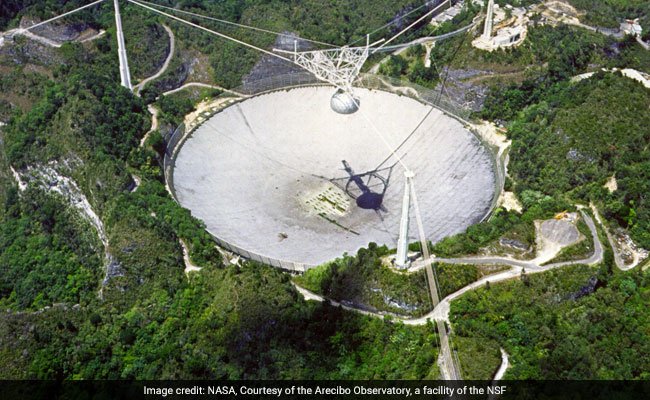
From NDTV
It presented a mystery within a mystery, said Mendez, a planetary astrobiologist at the University of Puerto Rico at Arecibo. First, did it originate in space, on the ground, or somewhere in near-Earth orbit? And second, wherever it came from, what could have produced it?Read more: http://www.ndtv.com/world-news/this-mysterious-space-signal-is-probably-not-from-aliens-1727858The signal was like nothing Abel Mendez had ever seen. It had the same frequency as radio emissions from satellites, but it pulsed like it came from something much more distant. It appeared only when Mendez and his colleagues had their telescope pointed at a single star - an unassuming red dwarf called Ross 128 just 11 light-years away.
It presented a mystery within a mystery, said Mendez, a planetary astrobiologist at the University of Puerto Rico at Arecibo. First, did it originate in space, on the ground, or somewhere in near-Earth orbit? And second, wherever it came from, what could have produced it?
After spotting the strange signal in May, Mendez did what a good scientist always does: He took a closer look. He sought the advice of experts, asked other observatories to watch for the signal and applied for more telescope time in hopes of detecting the pulses again.
Here's what he didn't do: speculate that it's aliens. But after he described the signal in a brief blog post last week, "that's all anyone wants to know about," Mendez said with an exasperated laugh. "I have that experience even with my family."
The impulse to attribute any odd astronomical phenomena to extraterrestrial intelligence is so compelling it's practically its own law of physics. But jumping to "aliens" at the slightest mention of a strange signal kind of misses the point, Mendez said. Not everything has to come from aliens to be cool. Space is full of sights we don't yet understand, sounds we haven't quite explained. Sure, the possibility that they're signs of life beyond Earth is thrilling, but so, too, is an encounter with any new natural phenomenon. And even when supposedly strange stuff in space turns out to be something mundane, that realization helps astronomers fine-tune their instruments and improve their surveys of the skies.
Whatever the result, mysteries like this one are a reminder of how much of our universe is left to explore - and motivation for scientists like Mendez to keep probing for answers.
"I have had so much mystery in my life in the past month," Mendez said. "We hate that."
Mendez's signal was initially detected during a campaign to observe nearby red dwarfs - very cool, dim stars that are widespread in our galaxy. Several of these stars are thought to be candidates to host planets that may be hospitable to life, so scientists are interested in knowing more about them. A few months ago, Mendez and his colleagues spent an evening surveying several red dwarf stars at the Arecibo Observatory in Puerto Rico - the world's largest fully operational radio telescope (China's Five-hundred-meter Aperture Spherical Telescope is still undergoing testing).
Follow @contentjunkie to stay up to date on more great posts like this one.

